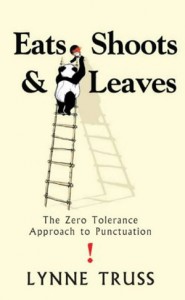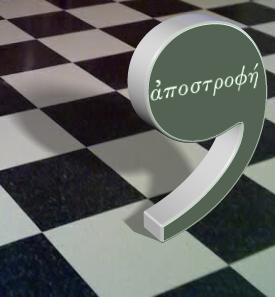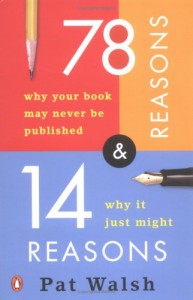Saturday, August 2: Mississippi Mud
AT EASE WITH THESE APOSTROPHES
by John M. Floyd
 British author Lynne Truss says one of the things that prompted her to write Eats, Shoots & Leaves was her sighting of a poster on the side of a city bus, announcing the Hugh Grant/Sandra Bullock movie “Two Weeks Notice.” The missing apostrophe was apparently more than Ms. Truss could bear. She decided to issue a wake-up call on how to use the King’s English, and the result was the most delightful book on punctuation ever written.
British author Lynne Truss says one of the things that prompted her to write Eats, Shoots & Leaves was her sighting of a poster on the side of a city bus, announcing the Hugh Grant/Sandra Bullock movie “Two Weeks Notice.” The missing apostrophe was apparently more than Ms. Truss could bear. She decided to issue a wake-up call on how to use the King’s English, and the result was the most delightful book on punctuation ever written.
Before I proceed, I have a confession to make: I wasn’t fond of English in high school and college, and would rather have taken poison than diagram a sentence. Somewhere along the way, I saw the light. Now — whooda thunkit? — I actually enjoy studying things like word usage and sentence construction and punctuation. And, while my interest does not qualify me to be a grammar policeman and has certainly never led me (thank God) to try to write a style manual, I can at least understand why Ms. Truss became so annoyed.
 Faithful readers of this blog might recall that I recently tackled — or at least grabbed and held onto for awhile — the subject of using and misusing semicolons. The truth is, that injustice pales in comparison to the misuse of apostrophes. Probably because there just aren’t as many semicolons running around out there. Periods or commas often fill in for semicolons and do a passable job. Apostrophes, though . . . well, those are harder to avoid.
Faithful readers of this blog might recall that I recently tackled — or at least grabbed and held onto for awhile — the subject of using and misusing semicolons. The truth is, that injustice pales in comparison to the misuse of apostrophes. Probably because there just aren’t as many semicolons running around out there. Periods or commas often fill in for semicolons and do a passable job. Apostrophes, though . . . well, those are harder to avoid.
Besides, apostrophes seem pretty simple. Just stick one in before or after an “s” now and then, and maybe in the place of an omitted letter or letters as in “didn’t“ or ”should’ve,” right? But sometimes there’s more to it than that. I think the reason apostrophes are so often misused is because they do seem so simple.
One problem is that they’re often inserted where they don’t belong. How many times have you seen a mailbox that says something like THE ANDERSON’S? I wouldn’t argue the fact that the box probably belongs to the Anderson family, but the sign on it should be a mere plural: THE ANDERSONS. No apostrophe. You might laugh, but I see this in beginners’ manuscripts all the time: “We asked the Cooper’s over for dinner.” The Cooper’s what? Lawyer? Neighbor? Housekeeper?
In her book Ms. Truss gives several good examples of the public misuse of apostrophes. Here are some signs she mentions having seen: TROUSER’S REDUCED, BOBS’ MOTORS, MENS COAT’S. One was a sign in a park that said GIANT KID’S PLAYGROUND. The apostrophe indeed indicates a possessive, but it’s misplaced. (She says she wasn’t surprised that the playground was empty: everyone was probably scared of the giant kid.)
An example from my own life is the name of a shopping center near the Crossgates subdivision, where I live. The sign in front of the group of shops says, in three-foot-high letters, CROSSGATE’S LANDING. (I kid you not.) I can only assume it’s alerting us that Mr. Crossgate will soon be approaching by air, since it makes no sense otherwise.
 I should mention here that most editors’ tolerance for apostrophe misuse runs pretty low. Pat Walsh says, in 78 Reasons Why Your Book May Never Be Published, “For the love of Pete, learn how to use an apostrophe. It is not hard and it is screwed up so often it is discouraging.”
I should mention here that most editors’ tolerance for apostrophe misuse runs pretty low. Pat Walsh says, in 78 Reasons Why Your Book May Never Be Published, “For the love of Pete, learn how to use an apostrophe. It is not hard and it is screwed up so often it is discouraging.”
Granted, some of the rules on its use are a little vague. One involves the possessive apostrophe following a word already ending in an “s”. Although there are a few exceptions, Strunk and White say you should usually add another “s” after the apostrophe. (Indiana Jones’s partner.) Other experts have said that final “s” should never be added. I’ve even heard that you should not add the final “s” only if the word that follows it begins with an “s”. (Indiana Jones’ sidekick.) Confusing, isn’t it? So when do you obey some of these nitpicky rules and when do you ignore them and decide for yourself? My opinion is, so many authorities contradict each other on this matter, we’re often safe to make our own decisions. When it looks right on paper and sounds right when spoken aloud, it’ll probably work.
Besides, according to Eats, Shoots & Leaves, Beachcomber’s Law of Conservation of Apostrophes states that a balance exists in nature: “For every apostrophe omitted from an it’s, there is an extra one put into an its,” thus the number of apostrophes in circulation remains constant. (By the way, its/it’s is the one punctuation mistake you really and truly don’t ever want to make, in a manuscript. It seems to defy the rules, since a possessive usually requires an apostrophe, and that’s probably the reason this error shows up so much — but commit it at your own risk. To quote Lynne Truss one last time, “If you . . . persist in writing, ‘Good food at it’s best,’ you deserve to be struck by lightning, hacked up on the spot and buried in an unmarked grave.”)
Anyhow, that’s my take, along with Ms. Truss’s considerable assistance, on this pesky little mark of punctuation. I wish I could say I saved the best for last, but I didn’t — I’m closing with a piece of my own light verse:
Some writing errors
Give me fits —
Like “who’s” for “whose”
And “it’s” for “its.”If that reaction
Seems excessive,
Say “Contraction,”
Then “Possessive.”To get the two
Confused ensures
The prose that’s published
Won’t be you’res.
Or mine.




















Reading this made me go back and double-check the position of the apostrophe in the title of my upcoming short story “A Hot Summer’s Death”. (Nervous? Who, me?)
Now if only someone could do something about that sign I saw last night at the Fuddruckers restaurant in the Waterfront: “Your in Good Hands.”
I loved this column!
When I retired from teaching, I wrote a book. After all those years, some as a high school English teacher, I quickly realized I needed a really good grammar reference.
The problem – those apostrophes!
Making a proper name that ends in s both plural and possessive at the same time still confuses me occasionally.
Thanks to Sheila, my wonderful copy editor at Berkley, none of my slip-ups have yet made it to the printed page.
Thanks for an interesting read!
Delightful column.
Alas, the giant kid problem will not vanish completely even upon restoring the apostrophe to its rightful place. “Giant kids’ playground,” if read the wrong way, is actually worse, because now the children will be afraid not just of one giant kid, but of several.
Let me therefore advocate the introduction of a mathematical device into English: bracketing. Just like its helps to distinguish (3+5)*7 from 3+(5*7), it can help us distinguish the (giant kids’) playground from the giant (kids’ playground). Thinking about it, maybe it should rather be the (giant kids)’s playground?
Whatcha sayin’? Makes for awkward readin’? Ah well…
Shame on me. There’s an “s” floating around in my post whose presence can’t even be justified by claiming I forgot an apostrophe. The first person who spots it will be awarded a pair of curly brackets.
There’s an “s” floating around in my [previous] post whose presence can’t even be justified …
Obviously: Just like its helps to …
Unfortunately for Kai’s eminently logical suggestion, parentheses already have a well-defined, one might even say circumscribed, rôle in punctuation. I therefore donate my newly acquired curly brackets for the purpose proposed.
No shame on you, Kai. That “its” was just a typo, and all of us make those all the time. The lack of or extra use of an apostrophe in its, though, when they suspect it comes from not knowing the rules, does drive editors crazy. I read someplace that it’s the one worst punctuation error you can make in a submitted manuscript. And the scary thing is, you might know the rule but just make the error by accident.
Thanks for the kind words, by the way–glad you liked the column. (You can keep my curly brackets for later use.)
Sorry, JLW — Guess you beat me to the prize.
How many times have you gone into a department store and seen the following:
MENS
WOMENS
CHILDRENS
(And now I see I don’t have a place to put the question mark.)
–Mike
I work for the Students’ Association of Grant MacEwan College. There are a few who get the name correct. The prize goes to a correspondent who referred to us as “The Stud Ass”, forgoing the the apostrophe. I think someone could write a column on abbreviations.
GIANT KID’S PLAYGROUND
Of course, if one truly desired to disambiguate the above, it ought to be
KIDS’ GIANT PLAYGROUND
or even better, simply
GIANT PLAYGROUND;
adult playgrounds being of an entirely different character.
Believe me, you don’t want to count the signs and ads and titles you see that have those kinds of mistakes in them. The editor I quoted, Pat Walsh, was correct: it’s discouraging.
The author photo on my copy of Ms. Truss’s book shows her holding a Magic Marker and leaning over the TWO WEEKS NOTICE poster, presumably ready to insert the missing apostrophe. I love that.
A while back I won an honorable mention for a story I sent off to a mystery contest. I’d carefully used my Strunk and White to check the punctuation, and when my ms came back with my award certificate, a lot of my carefully checked punctuation had been “corrected!!!”
I hate to admit it but I was on my fifth newspaper job before a managing editor sat me down and said I had better learn the difference between its and it’s, and do it quickly.
My pet peeve is the comma. The comma itself is OK, it’s the English major editors who insert six of them in every sentence that tee me off while I’m wasting time removing them.